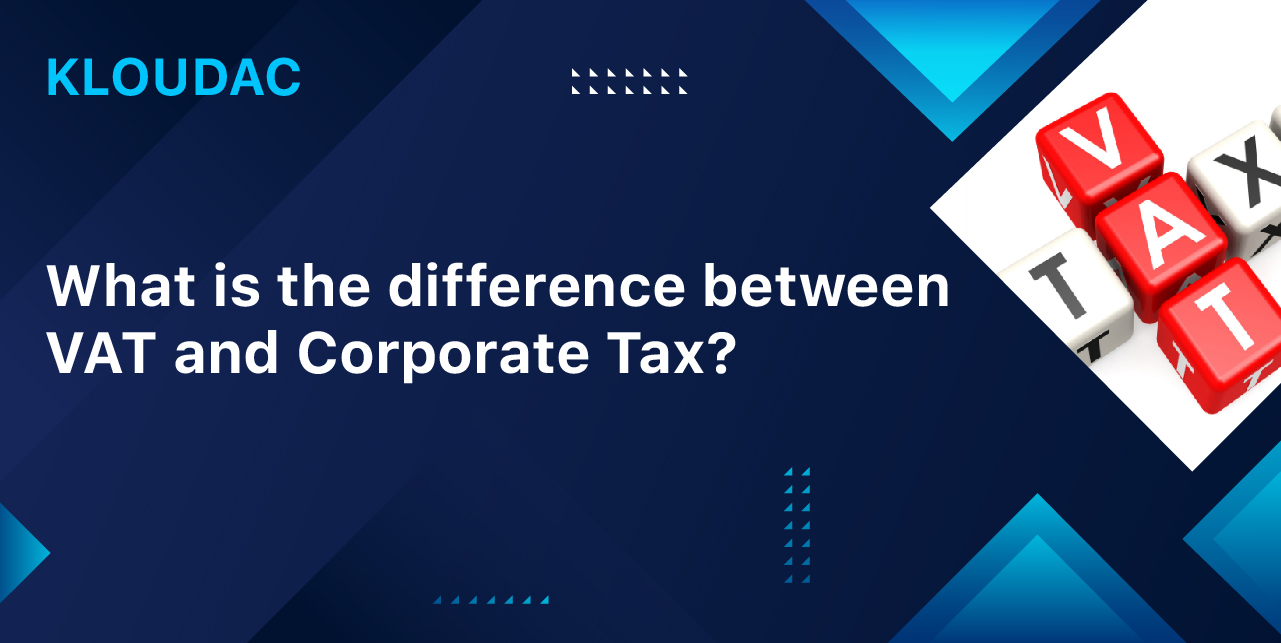For any business operating in the United Arab Emirates (UAE), understanding the tax landscape is crucial. Two important taxes that businesses need to comprehend are Value Added Tax (VAT) and Corporate Tax. Both these taxes play a significant role in the UAE’s economy and are administered by the Federal Tax Authority (FTA). In this blog, we will explore the key differences between VAT and Corporate Tax in the UAE, shedding light on their purposes, implications, and how businesses can navigate through their obligations.
Value Added Tax (VAT)
Value Added Tax, commonly known as VAT, is a consumption tax levied on the value added at each stage of the supply chain. Introduced in the UAE on January 1, 2018, VAT is imposed on most goods and services at a standard rate of 5%. Certain essential goods and services may be exempted or subject to a zero rate. The responsibility of collecting and remitting VAT to the government typically falls on businesses, adding an extra layer of compliance to their operations.
Key Characteristics of VAT in UAE:
a. Consumer-Driven: VAT is ultimately borne by the end consumer, as businesses collect the tax throughout the supply chain and remit it to the government.
b. Broad-Based: VAT applies to a wide range of goods and services, including imports, unless specifically exempted or zero-rated.
c. Input Tax Credit: Businesses can offset the VAT they paid on inputs (purchases) against the VAT they collect on outputs (sales). This mechanism prevents “tax cascading” and reduces the overall tax burden.
d. Threshold for Registration: Businesses with an annual turnover exceeding AED 375,000 are required to register for VAT. Voluntary registration is also possible for businesses below this threshold.
e. Filing and Reporting: VAT-registered businesses must file regular VAT returns, usually on a quarterly basis, and remit the VAT due to the FTA.
Corporate Tax
Corporate Tax, on the other hand, is an income tax levied on the profits of businesses. As of my last update in September 2021, the UAE does not impose federal Corporate Tax on companies. However, it’s essential to note that each of the seven emirates has the authority to introduce their own corporate tax regulations. As such, some free zones may levy corporate taxes on businesses operating within their jurisdictions. Moreover, companies engaged in specific sectors like oil, gas, and banking may also be subject to specialized tax rules.
Key Considerations of Corporate Tax in UAE:
a. Free Zones and Special Economic Zones: Many free zones in the UAE offer tax incentives to attract foreign investment, such as complete corporate tax exemptions for specific periods.
b. Local Taxes: While the UAE doesn’t have a federal corporate tax, companies may still be subject to municipal taxes or fees imposed by individual emirates.
c. Tax Residency: Companies need to be mindful of their tax residency status, as it can impact their global tax obligations.
d. Double Taxation Agreements (DTAs): The UAE has signed several DTAs with various countries to prevent double taxation and promote international trade.
Value Added Tax (VAT) and Corporate Tax are two essential taxes in the UAE with distinct purposes. VAT is a consumption tax levied on goods and services at each stage of the supply chain, while Corporate Tax is an income tax based on a company’s profits. VAT is widely applicable to most goods and services at a standard rate of 5%, whereas the UAE does not impose a federal Corporate Tax. However, companies should be aware that some emirates or free zones may levy corporate taxes.
KLOUDAC Accounting Firm Dubai, UAE
As a business owner in the UAE, understanding these tax concepts is crucial for compliance and effective financial planning. Engaging with tax professionals or consulting with the Federal Tax Authority can help businesses navigate their tax obligations and optimize their financial strategies in this dynamic and evolving tax environment. KLOUDAC is a well-recognized accounting firm that can guide you.
